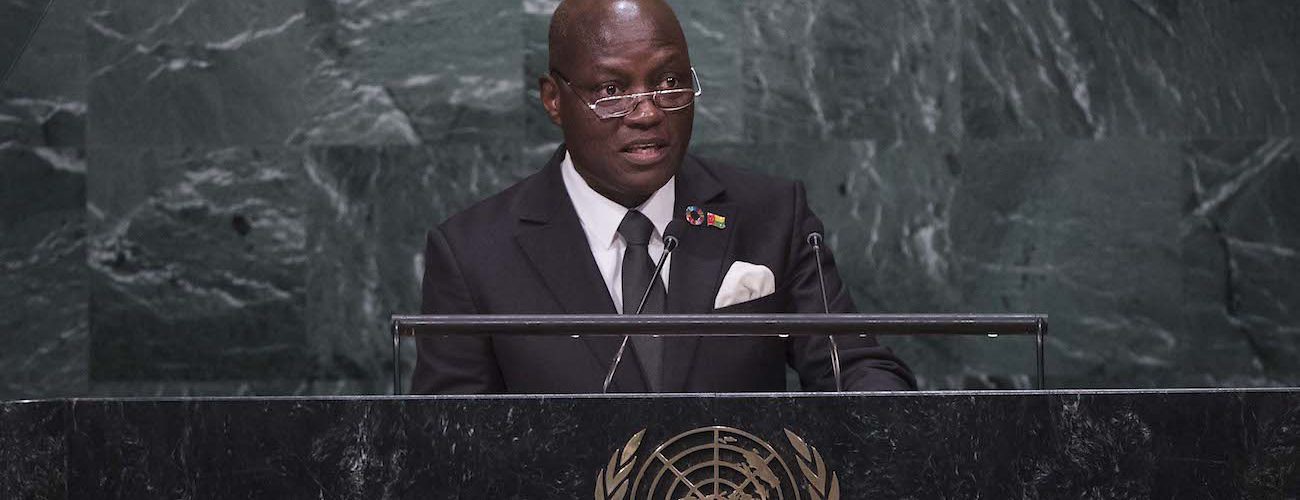Guinea-Bissau President José Mário Vaz addresses the United Nations General Assembly. New York, 21 September, 2016. (United Nations Photo)
Guinea-Bissau President José Mário Vaz issued a bullish challenge to opponents on May 19, to convene a sitting of parliament if they believe his government lacks the majority to effect legislation in the historically unstable West African state. The last such sitting came almost 12 months ago, with the hiatus owing to Vaz’s controversial decision to sack former Prime Minister Domingos Simoes Pereira, citing the ineffectiveness of his government.
The more complete explanation for the affair includes an ongoing power struggle within the ruling African Party for Independence of Guinea and Cape Verde (PAIGC). In the aftermath, with Pereira loyalists accounting for the majority of members of Guinea-Bissau’s legislature, they have effectively suspended governance by either blocking all legislation tabled by Vaz or by boycotting parliamentary sittings in their entirety. Highlighting the extent of the political paralysis, Vaz has been unable to pass a national budget since 2015 to address myriad socioeconomic maladies.
Seeking to end the impasse, the Economic Community of West African States (ECOWAS) intervened and facilitated negotiations mediated by the presidents of Guinea and Sierra Leone. This led to a political roadmap being brokered in September 2016. But, despite its early promise, the so-called Conakry Accord has failed to achieve its key mandate, namely the creation of a government of national consensus comprising both Vaz and Pereira loyalists.
This follows accusations by anti-Vaz PAIGC parliamentarians that the president’s most recently appointed government—the fifth since Pereira’s ousting—was formed without their consultation and continues to see a Vaz loyalist, Umaro Sissoco Embalo, preside over the prime ministerial post.
ECOWAS has since issue a stern warning to the country’s paralyzed polity, voicing its grave concern regarding what it sees as “a deteriorating socio-political situation in the country.” The communiqué came amid a marked increase in protests by residents of the capital, Bissau, calling for Vaz’s resignation. Many of these gatherings turned violent, as witnessed most recently on May 27, when 20 people were injured when police forcibly dispersed protesters near the Palácio da República in Bissau’s city centre.
In the same statement, ECOWAS promised to impose immediate sanctions against Guinea-Bissau’s leadership should it fail to implement the conditions as prescribed by the Conakry Accord. The bloc’s punitive measures have also drawn the support of the European Union. After organizing a 2015 conference in which it raised an estimated $1.1 billion in donor aid to support Guinea Bissau’s 10-year development plan, ECOWAS may also seek punitive measures should its investment fail to engender promised reforms.
The looming ECOWAS and EU threats of sanctions were likely the spur for Vaz attempting to convene a session of parliament, which would nonetheless only feign progress in ending the political deadlock. Of equal importance, however, could be Vaz’s belief that he may have garnered enough parliamentary support to break Pereira’s stranglehold over the legislature, following the recent defection of 15 pro-Vaz parliamentarians from the PAIGC, which saw the party’s 57-seat representations in the 102-seat National Assembly decrease to 42.
Their defection could result in Vaz orchestrating a new coalition government comprising the 15 decamped lawmakers and the opposition Social Renewal Party, which holds 41 seats. Should such a development occur, Pereira’s PAIGC faction would no longer enjoy the power to block Vaz’s attempts at promulgating national policies and legislation.
On initial inspection, then, the call to convene a parliamentary sitting appears to be well calculated by Vaz. Not only has he sought to initiate a legislative process which could provide a definitive end to the country’s debilitating stalemate, he has also presented the PAIGC as being the predominant obstacle to Guinea-Bissau’s stability. However, the success of this gambit will be contingent on whether or not the country’s internal and external stakeholders see through these actions.
Amid the ongoing deliberations, both the political and security environment in the country is set to further deteriorate. In addition to facing a growing threat of civil revolution, Vaz will also be aware of the danger posed by Guinea-Bissau’s armed forces. Mostly due to unconstitutional interference by the military, no president in the country has completed a full term in nearly three decades.
Mitigating the threat of a coup d’etat, however, is Vaz’s relationship with its hierarchy. He continues to be perceived as a loyal patron of the armed forces, particularly its chief of staff, General Biague Nantan. This mutually beneficial relationship will likely see the military continue to serve as the guarantor of Vaz’s political longevity, provided he blocks attempts at reforming the state security apparatus, which has long been accused of drug trafficking and other related criminality. Vaz will need to maintain a perception of strength heading into Guinea-Bissau’s 2018 presidential election, or risk losing executive powers to a candidate less malleable to the whims of the army.
Despite the promise of the political roadmap, the impasse has seemed closer to ending as a result of threatened sanctions, the parliamentary movements, protests, and the prospect of a military coup, though it is currently difficult to ascertain which has the greatest chance of finally ending the debilitating impasse.





